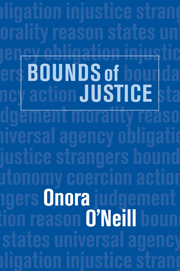Book contents
- Frontmatter
- Contents
- Preface
- Introduction
- Part I Philosophical Bounds of Justice
- Part II Political bounds of justice
- 7 Transnational economic justice
- 8 Justice, gender and international boundaries
- 9 Identities, boundaries and states
- 10 Distant strangers, moral standing and porous boundaries
- Bibliography
- Index
7 - Transnational economic justice
Published online by Cambridge University Press: 02 December 2009
- Frontmatter
- Contents
- Preface
- Introduction
- Part I Philosophical Bounds of Justice
- Part II Political bounds of justice
- 7 Transnational economic justice
- 8 Justice, gender and international boundaries
- 9 Identities, boundaries and states
- 10 Distant strangers, moral standing and porous boundaries
- Bibliography
- Index
Summary
JUSTICE ACROSS BOUNDARIES
The discussion of world-wide justice, and in particular of world-wide economic justice, is both new and messy. The messiness extends to the very terms used. The older term ‘international justice’ ostensibly presupposed that we begin with nations as units. In the modern period the units presupposed have in fact been not nations, but states, many of them not nation-states. However, the term ‘interstatal justice’ has gained no currency. This may be just as well, since the idea that justice could be divided into intrastatal and interstatal justice – justice within and justice between states – is also obsolete. The activities and relationships that link not only states but many other corporate bodies, including substatal political units, businesses, international and governmental agencies, non-governmental agencies, communities, professional organizations and charities, may all raise issues of justice. On the other hand, the term ‘global justice’ seems to beg questions by presupposing that the topic under discussion is a single regime of justice for the world. With misgivings I settle here on the relatively new terms ‘transnational justice’ and ‘transnational economic justice’, with the thought that these at least point to relations of (economic) justice that cross boundaries, that are not confined within any one set of states or institutions.
Behind this terminological messiness lie substantive difficulties. Transnational justice, and in particular transnational economic justice, is a hard topic because global economic relations and global economic distribution are also new possibilities. Moreover, principles of economic justice are themselves highly contested.
- Type
- Chapter
- Information
- Bounds of Justice , pp. 115 - 142Publisher: Cambridge University PressPrint publication year: 2000
- 7
- Cited by



